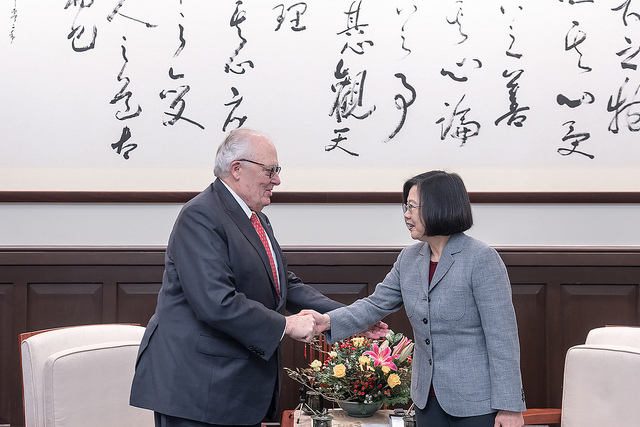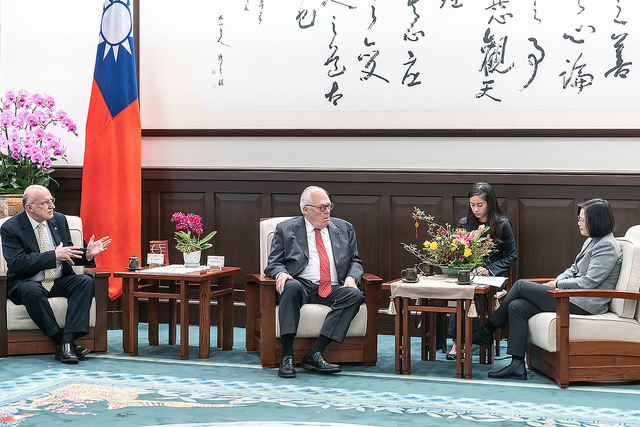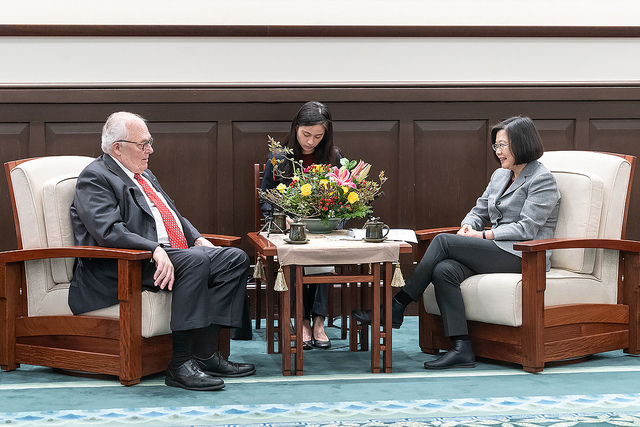News & activities
 News releases
News releases
During a meeting on the morning of January 31 with US Heritage Foundation founder Dr. Edwin J. Feulner, Jr., President Tsai Ing-wen outlined the government's efforts and achievements in creating a more open economy and liberalized trade in Taiwan. She emphasized that even as the government pursues structural transformation of the economy, it will also continue to work to solidify Taiwan's democracy and rule of law.
President Tsai opened her remarks by noting that Dr. Feulner is a good friend that she has known for many years. He has visited Taiwan more than 100 times, and it has been her pleasure to host him many times since taking office more than two years ago. Just last year, she met with him twice, proof that Dr. Feulner truly is Taiwan's best friend.
President Tsai pointed out that creating a more open economy and liberalizing trade in Taiwan are goals that she has pursued throughout her time in office. She then mentioned that Dr. Feulner was scheduled to attend a joint symposium held by The Heritage Foundation and the Chung-Hua Institution for Economic Research (CIER) presenting the 2019 Index of Economic Freedom later that day. This report, she said, has demonstrated the results of Taiwan's hard work over the past few years.
President Tsai noted that Taiwan ranked 10th among 180 economies from around the world, three spots higher than last year; Taiwan also came in 5th in the Asia-Pacific, its best ranking since 2008. The president pointed out that as globalization has continued to accelerate in recent years, digital technologies have brought about many opportunities; however, they have also tested government management capabilities. In the more than two years since this administration took office, she said, Taiwan's government has made great strides in deregulation, fiscal soundness, open markets, and energy sector transformation.
President Tsai further explained that the government made the most extensive amendments ever last year to the Company Act, in the hope of creating a flexible and open environment for start-up investment, attracting both talent and investment, to assist the overall structural transformation of Taiwan's economy. Recently, Google announced that it would be purchasing green energy in Taiwan, another example of an international corporation affirming the transformation of Taiwan's energy industry.
In addition to the economy, said the president, democracy and a strong rule of law are Taiwan's greatest assets. The Index of Economic Freedom states that a country's degree of economic freedom is strongly associated with healthier societies, human development, poverty elimination, and democracy. For that reason, while continuing to promote the structural transformation of the economy, the government of Taiwan will also continue to work to solidify democracy and rule of law.
President Tsai stated that it is clear the friendship between Taiwan and the US has continued to grow deeper over the past few years, thanks to the values we share and advocate. Recently, the US House of Representatives passed a resolution without objection supporting Taiwan's return to the World Health Organization (WHO). And at a recent session of the WHO Executive Board, the US praised Taiwan's work in disease prevention. She said Taiwan's government is very grateful for the United States' support, and hopes to strengthen cooperation in the future so that together, we can contribute more to the world. In closing, the president again welcomed her distinguished guests to Taiwan, and said she hoped they would lend Taiwan their full support. She also welcomed everyone to visit Taiwan often.
Following the conclusion of President Tsai's remarks, Dr. Feulner delivered remarks of his own. He said he was happy to be back in Taiwan with his colleagues, and to officially present the 2019 Index of Economic Freedom to President Tsai. Taiwan's global ranking this year of number 10 is its best ever, ahead of even the United States, he remarked.
Responding to President Tsai's remarks regarding the importance of economic freedom, Dr. Feulner said that economic freedom is not just advantageous for those in the upper echelons of society; it also helps improve ordinary people's standard of living and gives them more opportunities for economic participation.
Dr. Feulner said that at the CIER symposium scheduled for that afternoon he would mention that this year marks the 40th anniversary of the Taiwan Relations Act. He also said he would continue urging his colleagues in the United States to promote the signing of a Taiwan-US free trade agreement. In his view, a bilateral FTA would be beneficial to both countries, for in addition to solidifying bilateral relations it would also further strengthen economic ties.
Delegation members included Ambassador Terry Miller, Director of The Heritage Foundation's Center for International Trade and Economics, and Anthony Kim, Research Manager and Editor of the Index of Economic Freedom. They were accompanied to the Presidential Office by Minister of Foreign Affairs Joseph Wu (吳釗燮). Also attending the meeting was National Security Council Secretary-General David Lee (李大維).











